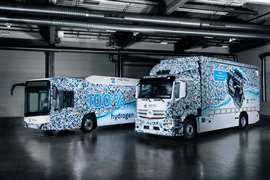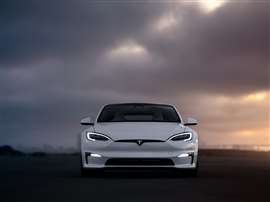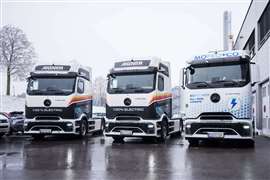Read this article in 中文 Français Deutsch Italiano Português Español
Insurance costs are a concern for commercial EV fleets
12 April 2024
 Prototypes of the 18-tonne truck and 12-metre H2 bus from Keyou (Photo: Keyou)
Prototypes of the 18-tonne truck and 12-metre H2 bus from Keyou (Photo: Keyou)
It’s probably not news to a lot of people, but insurance costs have been going up over the past 18 months. According to EY, consumer premiums in the UK have increased by 25% since the start of 2023 and are set to go up a further 10% in 2024.
It’s a similar picture for commercial vehicle fleets. According to the Association of Fleet Professionals (AFP), the situation is being compounded by the increasing number of electric vehicles being added to business fleets.
A variety of reasons have been put forward as to why EVs attract higher insurance premiums. To start, the average purchase price for an EV is about 25% higher than an equivalent vehicle with an internal combustion (IC) engine, with that vehicle replacement cost factored into quotes.
The cost of repairing an EV is also reported to be 50% higher than an IC vehicle. Those repairs can take 14% longer (or an additional 10 days off the road), which both highlights the complexity of tech used across EVs and the difficulty in repairing any damage.
But perhaps worse than any of this, the AFP claims that the insurance industry has been increasing the cost of premiums based on data that’s not applicable to EVs in commercial fleets.
Data source
Due to their prevalence in the UK market, much of the data being used to prepare insurance quotes for EV coverage is based on information related to Tesla models. According to numbers reported by Fleet News, a Tesla is 93% more expensive to repair than an IC equivalent.
 Popularity of Tesla models in the UK could be skewing insurance costs (Photo: Tesla)
Popularity of Tesla models in the UK could be skewing insurance costs (Photo: Tesla)
This erroneous market weighting, when combined with higher purchase and repair costs, could push EV insurance costs even higher, a situation which could reduce the number of potential EV buyers.
To help off-set any increase in insurance premiums, it is advised that managers carry out an internal risk assessment of their vehicle fleets and share this information with their insurance provider.
Details should include where vehicles are driven, in low- or high-traffic areas, and how they are operated. In addition, noting the specific make and model of an EV can be of additional benefit. These and other factors could result in a lower risk profile.
Should the provider elect to consider such a report, it would likely help to counter the influence of any more general market information on the total premium cost.
Package deal
In April, Keyou, a Munich-based OEM involved in the development and production of trucks using hydrogen internal combustion engines, teamed up with insurance provider HDI Global to offer insurance coverage for its vehicles.
Part of Keyou’s H2 Mobility as a Service program, the coverage is one component of the ‘all-round carefree package’ offered to logistics and forwarding companies in a pay-per-use model. This translates to where insurance coverage costs are calculated on a per-kilometre rate based on annual vehicle mileage.
Combined with the low-emissions powertrain, a vehicle service and maintenance package and, if required, delivery of hydrogen fuel, the inclusion of vehicle insurance is set to lower the risk of adopting low-carbon transport solutions.
“The idea of converting existing vehicles to run on hydrogen and renting them out to fleet operators as part of a comprehensive pay-per-use model excited us right from the start,” explained Matthias Rumpf, risk engineer at HDI Risk Consulting.
Stefan Daubinger, key account manager at HDI Global in Munich, added: “The challenge for us was to develop a completely new insurance product. After all, there was no previous experience with H2 engine-powered trucks.”
Research requirements
While hydrogen internal combustion engines and their battery-electric equivalents are different technologies, they are similar in being new to the market. As such, they require additional investigation to correctly determine risk and insurance costs. The same will be true of any trucks coming onto the market using hydrogen fuel cells as their primary energy source.
This initiative from Keyou could help convince fleet buyers who are not already wholly onboard with the idea of operating an EV fleet to make the switch to a low- or zero carbon transport solution.
It’s possible that with more commercial fleets featuring a greater number of EVs, insurance companies will carry out dedicated research on which to base coverage values. This would be preferable to having quotes based on vehicles which, while battery-electric, are wholly different from their commercial cousins.
POWER SOURCING GUIDE
The trusted reference and buyer’s guide for 83 years
The original “desktop search engine,” guiding nearly 10,000 users in more than 90 countries it is the primary reference for specifications and details on all the components that go into engine systems.
Visit Now
STAY CONNECTED




Receive the information you need when you need it through our world-leading magazines, newsletters and daily briefings.
CONNECT WITH THE TEAM













